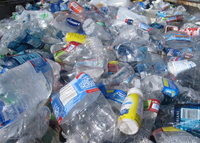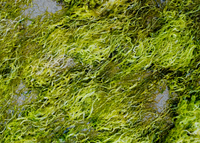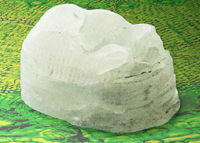The world is going through a lot. Instead of focusing on bad news, we’ve rounded up the most encouraging environmental stories that made headlines this month
The climate crisis is becoming more and more dire and presenting new challenges for life on this planet every day—urgent global collective action is needed and we must remain positive and committed to paving a more sustainable path forward. There are many important and encouraging efforts being made towards protecting and preserving the environment, so it’s important to acknowledge the good along with the bad.
So let’s celebrate these environmental wins that happened in March and stay motivated to protect the planet...
1. Scientists discover new enzyme that could dissolve plastic waste with “amazing efficiency Photo by tanvi sharma on Unsplash
Photo by tanvi sharma on Unsplash
A team of researchers from the University of Portsmouth in England have engineered a natural enzyme that could break down PET plastic, one of the most common polymers in plastic packaging. The enzyme targets one of the chemical building blocks of PET plastic called terephthalate (TPA), and the scientists have said it can dissolve the chemical with “amazing efficiency.” This is a sustainable alternative to the plastics being left to decompose in landfills or the oceans, where they emit harmful microplastics and toxins.
2. New coral reefs discovered to cope well with two degrees Celsius of global warming
 Photo by Hiroko Yoshii on UnsplashA new discovery with Hawaiian coral reef builders is providing hope to an otherwise bleak future for coral reefs, as two common species have been discovered to be surprisingly resilient to global warming, according to a study published in Nature Scientific Reports. The two species were subjected to simulated two degrees Celsius warmer waters and fared surprisingly well, which is promising for other reefs as long as temperatures can remain within the two degrees Celsius target set out in the Paris Agreement.
Photo by Hiroko Yoshii on UnsplashA new discovery with Hawaiian coral reef builders is providing hope to an otherwise bleak future for coral reefs, as two common species have been discovered to be surprisingly resilient to global warming, according to a study published in Nature Scientific Reports. The two species were subjected to simulated two degrees Celsius warmer waters and fared surprisingly well, which is promising for other reefs as long as temperatures can remain within the two degrees Celsius target set out in the Paris Agreement.
3. Turkey opens new “bio-economy”, turning organic matter into products such as biofuel Photo by Lasse Møller on Unsplash
Photo by Lasse Møller on Unsplash
A new carbon-negative project in Turkey has just launched that turns organic material, such as algae, into energy and useful products ranging from food supplements, pharmaceutical components, organic materials and biofuel. The new “bio-economy” is part of Turkey’s 'Integrated Biorefinery Concept for Bioeconomy Driven Development', or INDEPENDENT project, which sets out to provide fuel for the energy sector as an alternative to fossil and non-renewable resources.
4. Early warning alert system for climate and weather crisis will be rolled out globally in five years Photo by L.Filipe C.Sousa on Unsplash
Photo by L.Filipe C.Sousa on Unsplash
The UN has a plan for the entire world to have access to early warning systems for extreme weather and climate disasters within the next five years. This plan will be achieved by the World Meteorological Organization and will require $1.5 billion of finance. While this development may not help us avoid these disasters, it can at least help us prepare for them, especially in vulnerable and undeveloped areas.
5. Researchers have engineered a new strong, stiff, sustainable, plant-derived plastic MIT
MIT
Sustainable alternatives to our traditional plastics are needed in order to save the planet, and a team of engineers has harnessed cellulose nanocrystals (CNCs) from the strongest part of a tree to create a plastic that could be stronger, more sustainable, and naturally derived compared to current plastics. The cellulose-based composite is said to be stronger and tougher than some types of bone, and harder than typical aluminum alloys.
We hope these pieces of good news will encourage you to think positively and motivate you to play your part as we work towards a more sustainable future!




